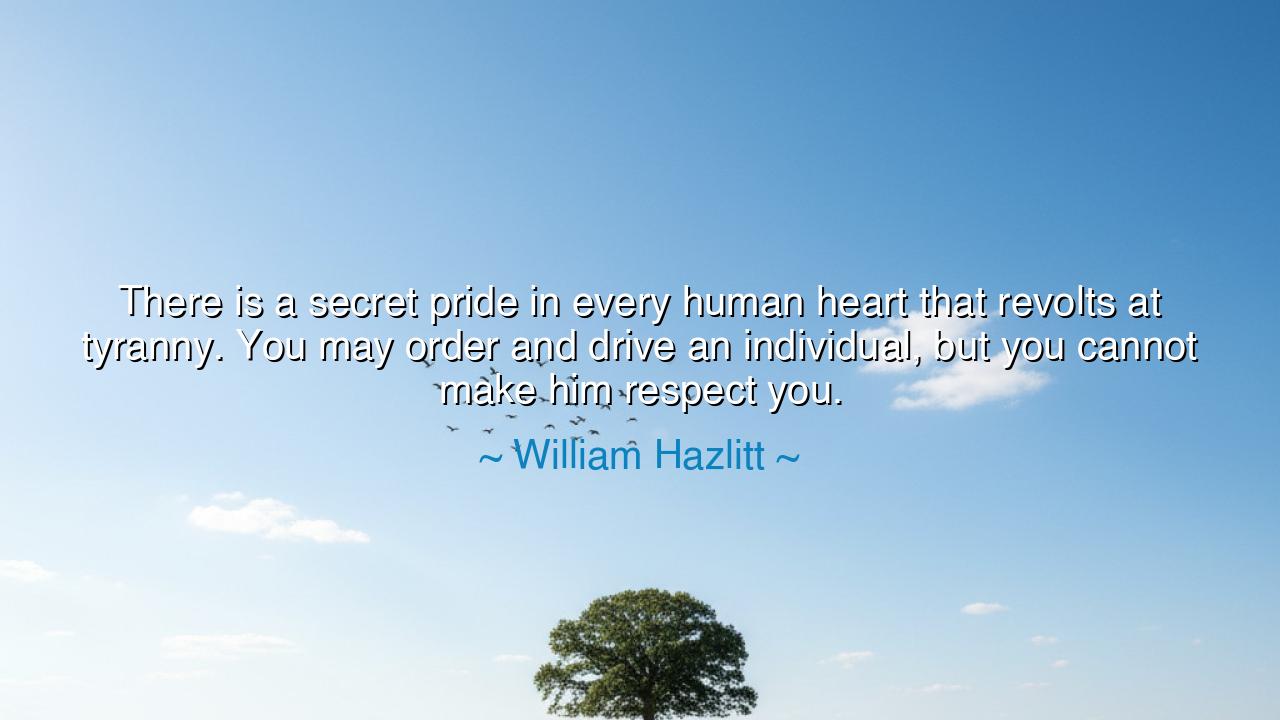
There is a secret pride in every human heart that revolts at
There is a secret pride in every human heart that revolts at tyranny. You may order and drive an individual, but you cannot make him respect you.






The words of William Hazlitt—“There is a secret pride in every human heart that revolts at tyranny. You may order and drive an individual, but you cannot make him respect you”—speak with the thunder of truth that echoes through all ages. In these words, Hazlitt captures the essence of human dignity—the innate flame of freedom that burns quietly but fiercely within every soul. It is the voice that refuses to be silenced, the spirit that will bow to command but not to contempt. His quote is not merely political; it is spiritual. It teaches that authority can compel obedience, but only virtue can inspire respect. No chain, no crown, no weapon has ever been able to command what the heart withholds.
To understand Hazlitt’s wisdom, one must first know the man himself. A philosopher, critic, and essayist of the early 19th century, William Hazlitt lived in the age of revolutions. The echoes of the French Revolution still trembled through Europe; monarchs feared the cry of liberty, and common men struggled to balance justice and chaos. Hazlitt, witnessing the rise and fall of powers, understood that though tyranny might rule through force, it could never rule the soul. The tyrant may sit upon the throne, but the true throne lies within the human heart—and that kingdom remains free. His words are not only a judgment of rulers but a mirror to all who seek to control others through fear or pride.
There is an ancient story that carries this same truth: the story of Spartacus, the slave who defied the might of Rome. For years, he lived under the lash, bound by iron, stripped of name and honor. Yet within him burned that “secret pride” Hazlitt spoke of—the invincible dignity that tyranny can neither crush nor comprehend. When he broke free and led the rebellion of slaves, it was not mere vengeance that moved him—it was the reclamation of his humanity. Though Rome crushed his body, his defiance lived forever, and the world remembered him not as a servant, but as a symbol of unbroken spirit. Thus, Hazlitt’s words find their living echo in Spartacus: power may kill, but it cannot command respect without justice.
Every generation must learn this truth anew, for tyranny is a chameleon that changes its colors but never its nature. It may come as a dictator with a sword, or as a manager with a smile; it may wear the robes of government or the garments of family, yet its heart is the same—the desire to dominate rather than to guide. Hazlitt warns us that when power becomes arrogance, it breeds rebellion. A ruler who demands respect by decree will only receive obedience in silence and hatred in secret. True reverence cannot be coerced; it must be earned through fairness, integrity, and compassion.
Consider also the fall of Napoleon Bonaparte, who rose as a liberator and fell as a despot. In his youth, he inspired men to march across Europe in the name of liberty and greatness. But when his ambition turned to tyranny, his soldiers began to follow him not with love, but with fear. He could order them into battle, but he could not make them believe in his cause. When his empire crumbled and he was exiled to the lonely rock of Saint Helena, he discovered too late that respect cannot be seized—it must be given. The people who had once called him emperor remembered his glory, but not his goodness. His fall was not only the end of a reign; it was the triumph of the human spirit’s quiet rebellion against domination.
Hazlitt’s words also hold power in the small kingdoms of daily life. In every family, every workplace, every friendship, the same law applies. To command through fear is to hollow out the soul of those you lead. Parents who rule without tenderness, leaders who demand without listening, lovers who possess without understanding—all become tyrants in miniature, and all will lose the respect they crave. The wise man learns that respect is born from empathy, not authority. The truly powerful do not need to shout, for their strength lies in the quiet nobility of their example.
The lesson of Hazlitt’s quote is thus both humbling and uplifting: you may control the actions of others for a time, but you can never control their hearts. To earn respect, you must appeal not to fear, but to honor; not to obedience, but to the shared dignity that dwells within all men. If you would lead, then lead by virtue. If you would be loved, then love first. The tyrant seeks to be obeyed; the wise seek to be understood. The tyrant’s power dies with his reign; the leader’s influence endures beyond his life.
So, my child, remember this truth when you walk among others: you may command hands, but not hearts. Treat all who stand before you not as subjects, but as souls. Never demand what can only be given freely—respect, loyalty, trust. For these are not the wages of fear, but the fruits of character. And when the day comes that your own power fades—as all power must—you will find that what remains is not the echo of your orders, but the memory of your fairness, your courage, and your humanity. Then, and only then, will the world remember you not as a tyrant, but as a man of dignity—and that is the highest rule of all.






AAdministratorAdministrator
Welcome, honored guests. Please leave a comment, we will respond soon